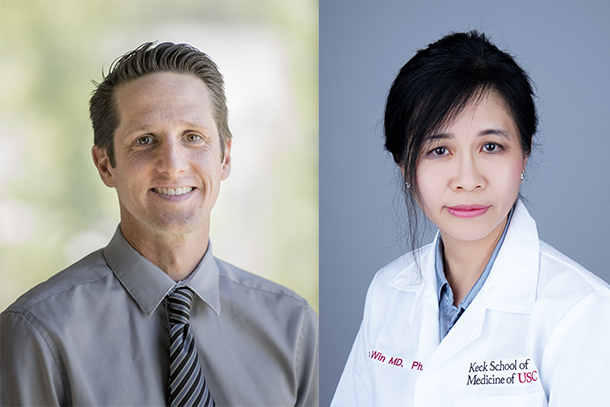From the brain to the bile, the Donald E. and Delia B. Baxter Foundation is supporting innovative medical research by granting $100,000 awards to two assistant professors at the Keck School of Medicine of USC: Michael Bonaguidi, PhD, in the Department of Stem Cell Biology and Regenerative Medicine; and Sanda Win, MBBS, PhD, in the Department of Medicine’s GI/liver division.
Win will use her award to explore the role of a protein called Sab in liver diseases. Young adult female mice and premenopausal women have relatively low levels of Sab in their livers, and this confers resistance to both chronic and acute liver injury. Win aims to understand how females keep their Sab levels low, as well as how this protects their livers.
“The hope is that our research will lead to new approaches to preventing and treating not only liver diseases, but also metabolic syndrome, obesity and diseases in other organ systems,” Win said. “I’d like to thank the Baxter Foundation for supporting us in this quest.”
Bonaguidi will use his award to develop computer programs called “ROOT” to optimize the process of developing drugs to improve neural decline due to aging. Using genomics data, ROOT has already predicted which existing FDA-approved drugs might effectively target the root causes of age-related cognitive decline in mice. He will now test whether the predicted drugs improve the function of neural stem cells as well as memory in older mice.
“Bringing a drug to market currently requires more than a dozen years and around $1.6 billion dollars,” Bonaguidi said. “Our goal is to reduce this time and expense, enabling the more rapid and cost-efficient development of drugs to treat diseases of aging ranging from Alzheimer’s disease to cancer. We are grateful to the Baxter Foundation for their investment in this research.”
Jane Haake Russell, president of the Baxter Foundation, added: “We are proud to support Dr. Michael Bonaguidi and Dr. Sanda Win. Their work helps fulfill our mission to fund young scientists who are exploring novel approaches in research with the potential to radically alter health care.”
— Cristy Lytal


